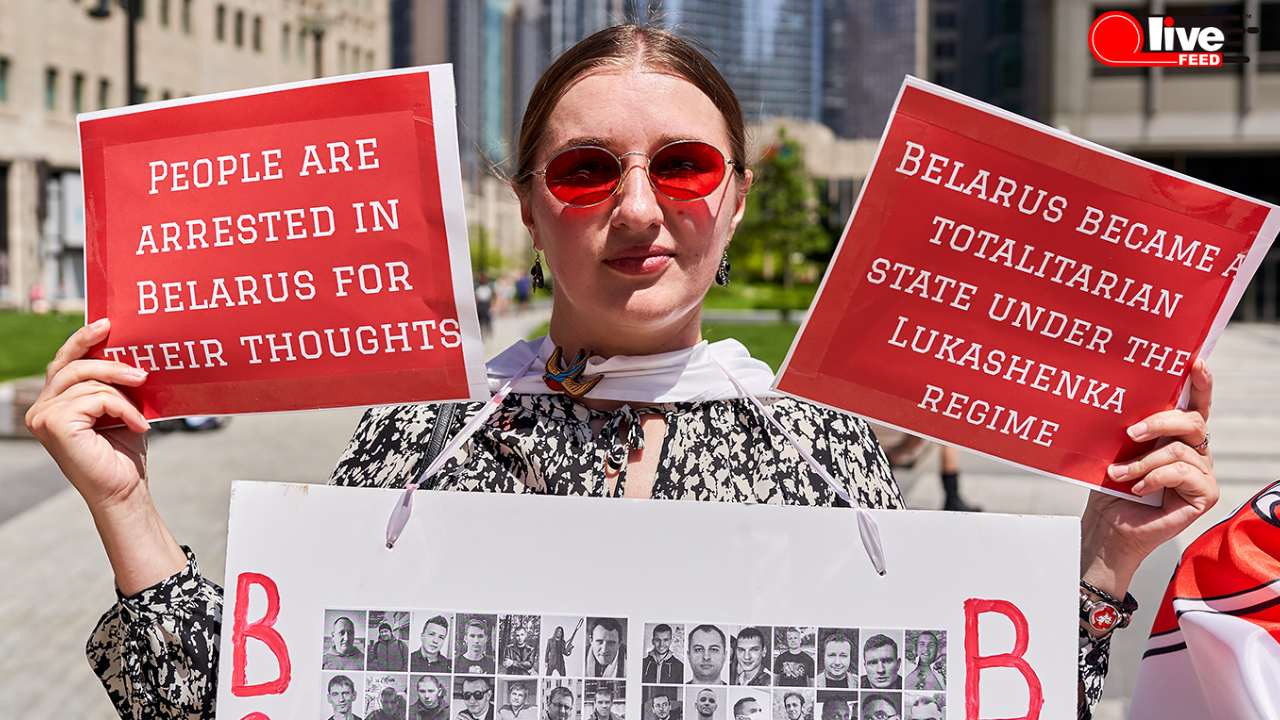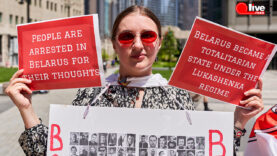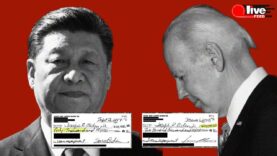Belarusian Americans rally in support of political prisoners back home

As a political and ecological activist living in a small provincial town, Vitold Ashurak was especially inconvenient to the regime. After all, the notions of stable and widespread support of the Belarusian government outside of the metropolitan areas have been one of the main pillars of the state-sponsored media for decades — which also was the reason why protests in small towns and villages were suppressed most brutally.
On August 9, 2020, Ashurak took part in a peaceful rally protesting the results of the presidential election, which many considered to be rigged. He was arrested. A month later, he was arrested again. Only that time, it was much more serious. Criminal Code Articles 342 and 364 were no laughing matter — “Organization and preparation of actions that grossly violate public order, or active participation in them” and “Violence or threat of violence against an employee of the internal affairs bodies.” Judge Maksim Filatov held the trial behind closed doors, citing a “state security threat” as a reason. On January 18, 2021, Ashurak was sentenced to five years in prison, in addition to the compensation he had to pay to the state.
At the time, Ashurak’s five-year prison term was the longest one for those who participated in the protests. Later in 2022, some political prisoners, like Mikalay Autukhovich, got sentences as long as 25 years. Multiple Belarusian activists were sentenced to prison terms ranging from 2½ to 20 years.

Ashurak was imprisoned in the correctional colony No. 17 in Shklow, one of the darkest places to be if you do not agree with your government. In one of his letters, Ashurak shared that the prison administration forced him to wear a well-visible yellow tag on his clothes, to emphasize the fact he was there on political charges.

On May 21, 2021, Ashurak’s relatives were told that he died in prison from cardiac arrest. However, according to his family, he never had heart issues. On May 25, 2021, his body was transferred back to his family with a bandaged head. His cause of death was never officially investigated.

To commemorate the life of Vitold Ashurak as well as the lives of others who fight for freedom and democracy in Belarus, May 21 became the International Solidarity Day with Political Prisoners in Belarus, recognized and commemorated globally.
“As we consider the regression of democratic values in the 21st century, we need to look no further than the example of Belarus. At the end of the 20th century, and by the beginning of the 1990s, Belarus was a newly-independent state with great potential to become a democratic nation.

However, 28 years later, Belarus is a country suffering from an autocratic regime with pro-Russian leanings, and a level of societal repression that is difficult to comprehend. Freedom of expression, assembly, and media have all been undermined, and basic human rights have been consistently disregarded,” says Volha Broughman, representative of the Association of Belarusians in America that helped to organize the solidarity rallies in May.

Since the summer of 2020, the Belarusian regime has made over 40,000 politically motivated arrests, which is considered the highest number in Europe within the past 40 years. There are over 12,000 politically motivated criminal cases. As of today, around 1500 political prisoners still remain behind bars in Belarus, for exercising their human rights and fundamental freedoms and protesting the contested elections and also Russia’s war in Ukraine. But it’s not just protesters who are jailed. Behind bars, you can now find pretty much anyone — from 2022 Nobel prize winner Ales Bialiatski to former presidential candidates, prominent lawyers, journalists, and businessmen.

At the country’s population of just about 9 million, the numbers of those arrested on political grounds are alarmingly high. For years, the United Nations and human rights organizations have been raising alarms about the level of arbitrary detentions and repressions in Belarus.

According to the UN report published in March of 2022, which covers the run-up to the August 9, 2020 elections and the aftermath up to December 31, 2021, the fundamental human rights of tens of thousands Belarusians have been violated by the government’s continued crackdown on opponents, civil society, journalists and lawyers, without yet seeing the perpetrators held accountable.

In total, between May 2020 and May 2021, over 37,000 people were detained, many of them placed in administrative detention for up to 15 days. Of this total, around 13,500 people were arbitrarily arrested and detained between August 9 and 14 alone, the UN Human Rights Office report states.

According to the witnesses, nowadays things like wearing a shirt of “wrong” colors, or even liking a “wrong” post on social media can and do lead to arrests in Belarus. Out of fear for their lives, many Belarusians were forced to flee the country.

However, Belarus’ problems do not end in Belarus, Broughman says.
“Lukashenka’s regime poses a significant threat to the world, as evident from the situation with the Ryanair plane in 2021 and Lukashenka’s involvement in Russia’s war in Ukraine. Western politicians want the situation in the region to remain predictable and calm, which is not possible with countries that have autocratic regimes. Reinstating democracy in Belarus is the only way to ensure security.”

As the political crisis in their home country continues, Belarusian Americans joined global solidarity events and rallied in support of political prisoners back home. Belarusian communities of San Francisco, Charlotte, Detroit, New York, Chicago, San Diego, Philadelphia, Miami, Boston, and many others have joined in.

Belarusians signed letters and postcards to the political prisoners, walked along the streets distributing leaflets on how to help Belarusian political prisoners, and even took part in a 200-mile Ragnar Relay to raise awareness. A liturgy was held in Miami to pray for those who had been tortured to death.

Broughman is passionate about Belarus. She recalls the slogan she saw at one of these solidarity rallies, “I stand up for myself and my friends in Belarus.”

“Every contribution counts, be it signing petitions, spreading information, addressing representatives in Congress, writing letters to political prisoners, or attending rallies. Even small efforts can contribute to an ocean of Belarusian hearts which can wash away autocracy from our Motherland.”

On the night of August 9, 2020, shortly after the poll stations were closed, the Central Election Commission announced Aliaksandr Lukashenka as the winner of the presidential election, crediting him with over 80% of the votes. At the sixth term in office, Lukashenka has won every election since 1994, with all but the first one being labeled by international monitors as neither free nor fair.
Buried on May 26, 2021, per his last will Ashurak’s body was covered with a white-red-white flag. Even though this flag is deeply rooted in Belarusian history, the government of modern-day Belarus forbids its public display. Those who defy these orders are jailed and often tortured.

As of today, around 1500 political prisoners still remain behind bars in Belarus. According to the Human Rights Center “Viasna,” most of these people were targeted by politically motivated criminal prosecution in connection with the events that took place during and after the presidential election of August 2020. As years go by, repressions in Belarus only escalate further, with the country remaining the black hole of lawlessness right in the center of Europe.
Do you have anything else to share or add to this coverage? Sign up for a free account, and post directly to our LiveFEED! Subscribe to our Youtube channel here.

















































